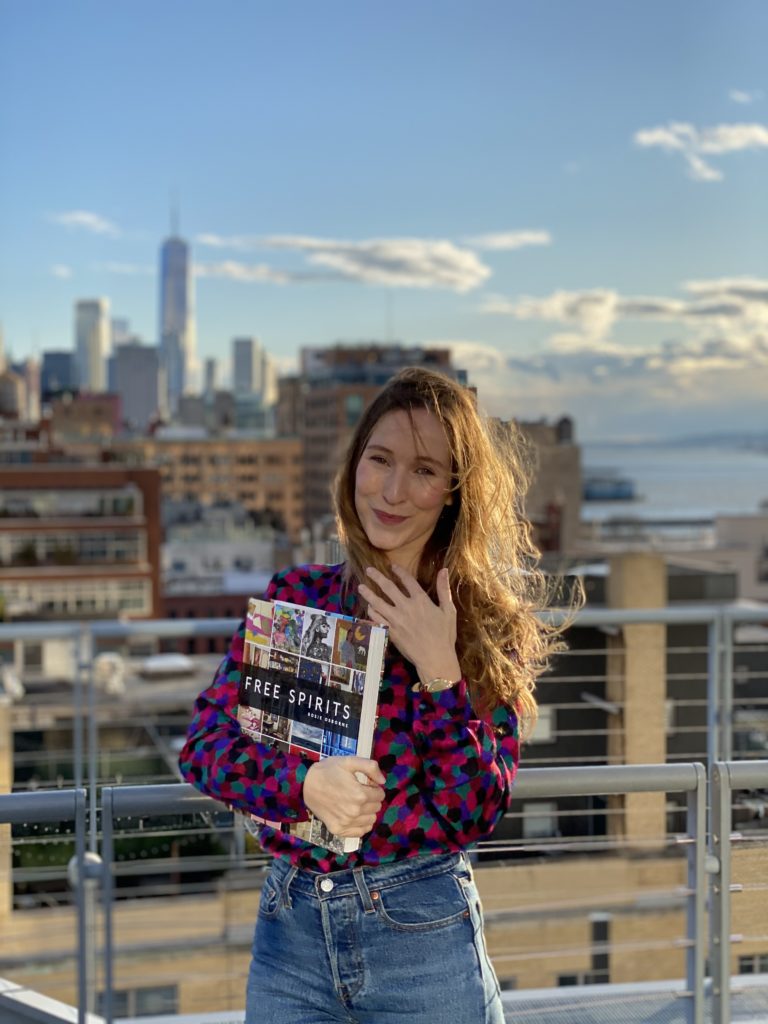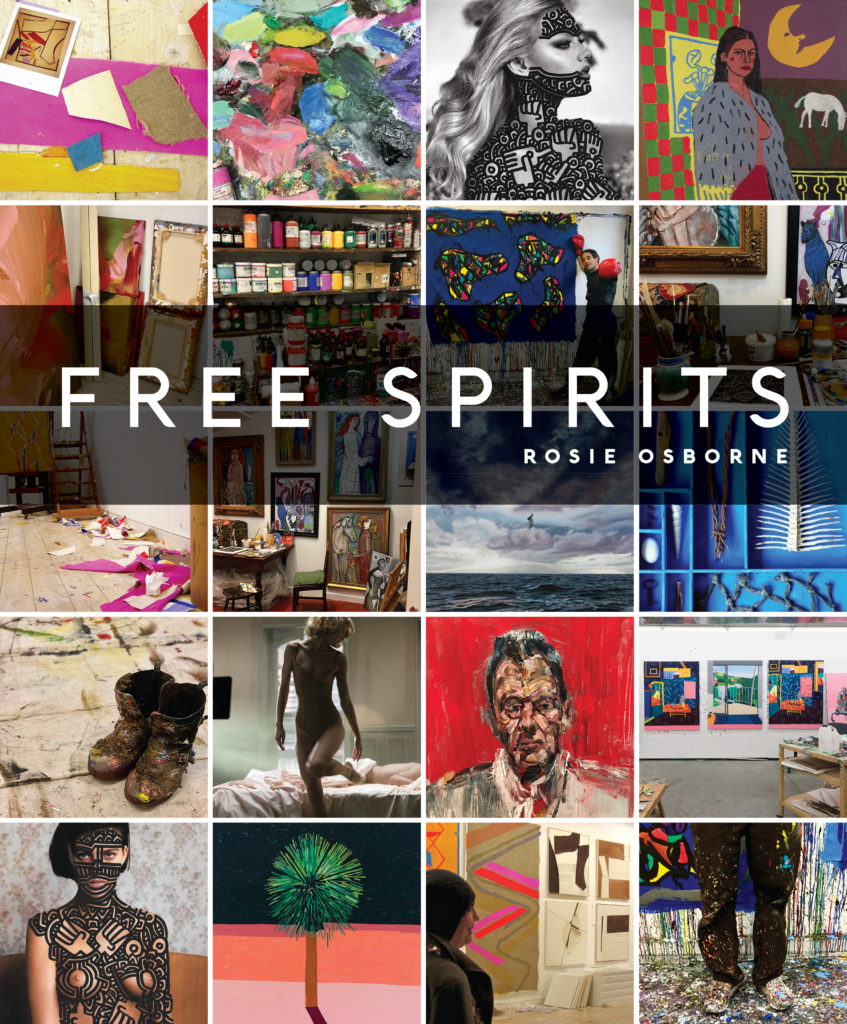 While still in her teens, author and award-winning photographer Rosie Osborne made a vow to herself. She promised that by the time she turned 30 she would have published a book collecting her exclusive access-all-areas interviews with some of the UK’s most dynamic contemporary artists such as Sylvette David and Danny Fox.
While still in her teens, author and award-winning photographer Rosie Osborne made a vow to herself. She promised that by the time she turned 30 she would have published a book collecting her exclusive access-all-areas interviews with some of the UK’s most dynamic contemporary artists such as Sylvette David and Danny Fox.
All those years later she achieved her ambition and the result is fascinating new coffee-table tome Free Spirits. We caught up with Rosie to find out more…
Q. Free Spirits is obviously aimed at art lovers, but what do you think is its unique appeal?
A. I hope that it offers an insight into the private side of artistic practice, and the everyday struggles and triumphs that artists experience. I think there’s a very human side of art that can sometimes be hidden by the polished gallery shows or the museum retrospectives and that’s what I have tried to delve into.
Q. All the interviewees must have been fascinating to speak with, but are there any that especially stand out to you?
A. Interviewing British artist Danny Fox last year was fascinating. Fox is a self-taught painter who grew up in St Ives, Cornwall, where I spent a lot of my childhood. As a teenager, he worked long hours in restaurant kitchens, washing up dishes to save up to buy paint. I remember him saying at the time that if he was offered a job with more responsibility, he’d turn it down, because he didn’t want to take up the mind space that he needed for painting. I went to his first exhibition in St Ives when I was 15 and was really moved by his painting style. Although Danny didn’t go to art school or have any contacts, he moved to London, where his work started to gain more and more recognition. Over the years following, his paintings were featured in shows all over Europe and America, and he is now based in Los Angeles, California. Danny’s work ethic from day one always inspired me, and his paintings are amongst my favourites, up with Picasso and Matisse. Last year, 15 years after attending his first exhibition, I interviewed Danny back in Cornwall. It was so interesting to discuss all of the years that had passed, especially back in St Ives, where it all started.
Q. You interviewed artists over a space of 17 years. Does this mean there are more interviews yet to be published and, if so, what are your plans in this regard?
A. Yes, I selected 13 interviews for Free Spirits, but I’ve got around a hundred interviews ready for publication. I publish some interviews on my website, but I hold on to lots in order to wait until what feels like the right time to release them.
A. You were only a teenager when you started conducting the interviews. Did you find any resistance to your interview requests and how did you overcome this?
A. I’ve learnt that it’s really important to use rejection to propel you to move forward. Many of my requests to interview my favourite artists as a teenager were left unread, or I just never heard back from them. Over the years, I started to see it as a process of elimination. Four artists out of five may not have replied, but one often did. Putting everything into making that one interview as good as it could possibly be would mean that the likelihood of future artists saying ‘yes’ was much more promising. I saw it as a process, like any person learning to improve or perfect their trade. Nothing comes easy. I truly believe that if you can learn to take rejection on the chin, and turn it into a positive force, nothing can hold you back from getting to where you’ve always wanted to be.
Q. How would you describe the importance of contemporary art to those who may not be familiar with it?
A. I think that in order to attempt to understand contemporary art, it helps to look back to what came before it. Picasso said that, “Every act of creation begins with an act of destruction”. Everything in art is consciously, or subconsciously, a reaction to something that has come before it, so the symbolism or meaning of a piece of contemporary art can sometimes be linked to something that came hundreds of years before.
Q. If you could travel back in time, which one artist from the past would you like to speak with, and what would you ask them?
A. I’d love to interview Henri Matisse, towards the end of his life when he worked from his studio in a wheelchair. After undergoing surgery for cancer, he lost his mobility. Instead of giving up, Matisse drew incessantly and rediscovered the medium of paper cutouts. He talked about how he felt completely reenergised, and called the last 14 years of his life “une seconde vie” (his second life.) I’d love to ask him about this stage of his life, and how the work that he was able to do in the studio, in a sense, saved him.
Q. Your book features a wealth of photos with the artists in their studios. Why did you think this important to include?
A. It’s impossible to describe some of the studio scenes in the book with words! They’re all completely different: some are orderly and tidy and some are filled floor to ceiling with collected objects and everyday items alongside art materials. A studio space that I really enjoyed documenting a couple of years ago belonged to Cornish artist Samuel Bassett. I tried to take photographs of his working space that were really honest, so that the reader feels as if they’re standing in the room, observing every detail. His small studio was filled with surfboards, crates of paint, sofas, packs of cereal, saucepans and all of his kitchen items, along with works in progress and paint dripped over absolutely everything. It was great fun spending time there. It’s honestly impossible to describe, but the images say it all! Artists’ working spaces are often very transient places. As Samuel no longer paints there, the room was painted white, ready for the next artist, and the spirit of that room has changed and become something else. That’s why I felt compelled to try to record the atmosphere in that room in some way.
Q. Free Spirits also serves as a memoir of your personal development. What achievements to date are you most proud of?
A. Getting the book out into the public sphere felt really significant to me. I promised myself at 17 years old that I’d publish the book before I turned 30. Free Spirits came out the day before my 30th birthday. It’s definitely the personal accomplishment that I feel most proud of.
Free Spirits by Rosie Osborne is available now, priced £30 in hardcover. Visit www.rosieosborne.com

